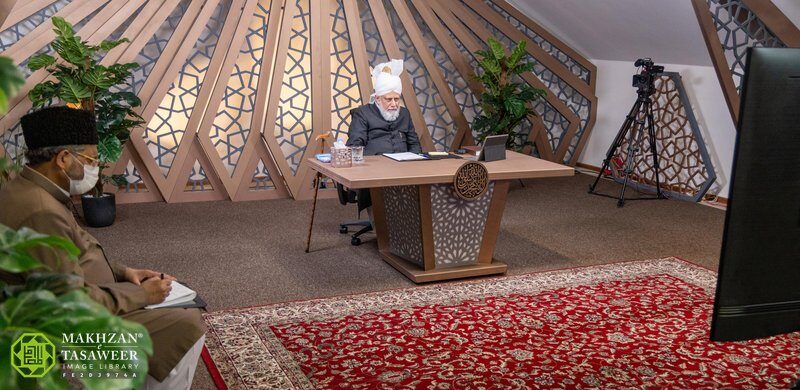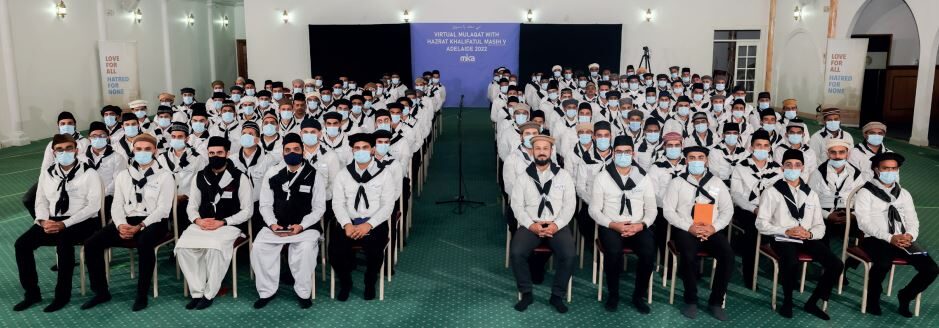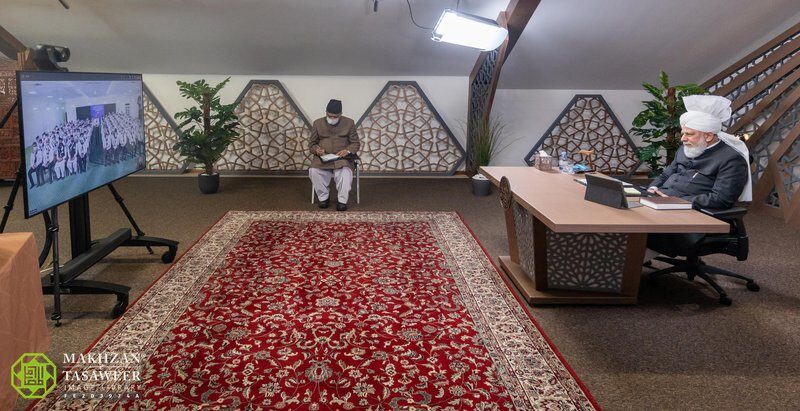
On 5 June 2022, members of Majlis Khuddam-ul-Ahmadiyya from Adelaide, Australia had the opportunity to meet with Hazrat Mirza Masroor Ahmad, Khalifatul Masih Vaa through a virtual mulaqat.
As the live stream started, Hazrat Khalifatul Masih Vaa conveyed his salaam and called Ijaz Gondal Sahib to recite a portion from the Holy Quran. After the recitation, Wali Raza Khan Sahib presented the English translation.
After he finished, Hazrat Amirul Momineenaa asked him if he was from Fiji or Pakistan, to which he replied that he was from Pakistan. Then, Syed Ahmad Waleed Sahib read out the Urdu translation, after which Muhammad Furqan Ilyas Sahib was invited to recite an Urdu poem and Hizqeel Khan Sahib presented its English translation.
An Urdu extract from the writings of the Promised Messiahas was presented by Monus Ahmed Din Shaikh Sahib and Khizar Rana Sahib then read the English translation.
Following this, a short video report exhibiting various activities in Adelaide was then presented before Huzooraa.
Hazrat Amirul Momineenaa then asked Waqas Ahmad Sahib, Sadr Majlis Khuddam-ul-Ahmadiyya Australia how many Ahmadis were in Adelaide, to which he was told there were 600. Huzooraa asked about the number of khuddam in the region, to which Waqas Ahmad Sahib reported that there were 230 khuddam, which included members from Perth.
Thereafter, the khuddam had the opportunity to ask Hazrat Amirul Momineenaa any questions they had.
Ataul Hadi Sahib said that there was a trend observed in khuddam where the attendance in tarbiyat-related activities was far less than the attendance in sports or other activities of leisure. He asked Huzooraa to share his guidance on this matter and what the solution to this was.
Huzooraa explained:
“Nowadays, because of the involvement in worldly things, you [some of the youth] are deviating from your religion, you are forgetting what are your religious duties, you are forgetting the duties you owe to Allah the Almighty. This is why the pattern of interest and the preference of interest has changed”.
Huzooraa said that khuddam should be explained the purpose of their lives as highlighted in the Holy Quran.
Huzooraa went on to explain, “If we realise the purpose of our life, then we shall take more interest in religious obligations.” Huzooraa said that proper tarbiyat must be conducted by the parents “when they attain the age of seven, then Atfal-ul-Ahmadiyya organisation should [also] take care of them, teach them what are their duties, what are their obligations: they should pray five times and they [should] bow before Allah Almighty and always be thankful to Allah Almighty that He has provided us so many things. Once they realise this, then when they grow up, when they enter the age of Khuddam-ul-Ahmadiyya, they will realise their duties”.
Huzooraa said that tarbiyat was a continuous process, “So from the very childhood, at all the stages they pass through, we have to take care of our atfal, khuddam youngsters.”
Syed Waleed Ahmed Sahib asked Huzooraa what role a father should play in the upbringing of his daughters.
Hazrat Khalifatul Masih Vaa answered:
“The same role which you play in the tarbiyat of your son. Your question should be, ‘What role should a father play to do tarbiyat of their children.’ So, as I have already said, parents should discharge their duties of training their children from the very childhood, let them understand who they are, who the Muslims are, what the kalima is and what the blessings of Allah Almighty on us are, how Allah Almighty has given us so many things in this world and how, because of that, we should be thankful to Allah Almighty. And also set your own example.”
Huzooraa emphasised that it was essential for parents to set their example before their children. He said that children were very sharp and observed each action.
Zeeshan Babar Sahib asked Hazrat Khalifatul Masih Vaa if he had ever had a life-changing moment other than becoming the Khalifa.
Huzooraa said:
“When I decided to do waqf. As I have already explained in my previous mulaqat with American khuddam that my father and uncle were discussing that there were very few people in the family of the Promised Messiah, peace be upon him, who were waqif-e-zindagi. So, when I heard it, at that time, I decided that I would try to do waqf and for that, I prayed and Allah Almighty helped me. That was the moment, I can say, Allah Almighty accepted my prayer and despite the fact that I was not good in my studies, He made the circumstances in such a way that I was forced to do waqf and that was the life-changing moment in my life.”
Zahid Sarfraz Sahib said that he had been in Australia for two years, but his English was not very good. He asked how he could still do tabligh.
Huzooraa said that he could take a brochure or leaflet with the message and information of the Jamaat and “distribute it among people.”

Fateh Ahmed Gondal Sahib said that in schools in the West, children were taught freedom of self-respect and independence and were told to make their own decisions. He asked Huzooraa how one could explain to their children that the biggest decision of their life was made by their parents without their consent (referring to the Waqf-e-Nau scheme). He further asked how children could be prepared to fulfil their waqf.
Hazrat Khalifatul Masih Vaa explained that everything started from childhood. Huzooraa said that Muslims had been guided to call the azan and say the Kalima Shahadah in the child’s ear when they were born. Huzooraa explained, “Start the child’s upbringing from the moment they are born”. It was the duty of parents to pray for the child daily.
Huzooraa emphasised the importance of setting one’s own example. The upbringing which was essential for all children was essential for Waqf-e-Nau children too.
Huzooraa stated that he had said that when a Waqf-e-Nau child reached the age of 15, they should write to the Jamaat if they wished to continue their waqf or not, and then renew the bond after university again.
Huzooraa said that as it was the desire of parents that their child be included in the Waqf-e-Nau scheme, then it was also the duty of the parents to pray and fittingly raise the child.
Hazrat Amirul Momineenaa said that he delivered a Friday Sermon in Canada about the essence of Waqf-e-Nau in which he detailed various matters about being a waqif-e-nau.
Sheheryar Ahmad Sahib asked Huzooraa that if Allah’s love for His creation was far greater than a mother’s love for her child, then why was the concept of Hell so severe.
Huzooraa explained that parents still punished their children for the child’s reform. Even though Allah is Merciful, man is so depraved that he can still manage to get punished. Here, Huzooraa said, man is then at fault and not Allah Who is the Ever Merciful.
Huzooraa said that Allah the Almighty had told us what was good and what was bad. If man did good, then he would be rewarded, and punished if he committed bad deeds. If man was of the view that Allah would not punish and would only show mercy, then man would stoop even lower in his depravity.
Highlighting Allah’s mercy and alluding to a hadith, Huzooraa said that Allah even forgave the person who killed 100 people. Huzooraa then narrated a story of a killer whose mother didn’t scold him as a child and, as a result, he went on to commit bad deeds. The moral of the story was that if the mother had disciplined her child, then the child would have learned not to commit certain acts; however, if a child was not disciplined, then he would continue down a path of committing bad deeds.
It is man who is at fault if he is unable to attain God’s mercy and instead invites His wrath.
Rabbani Ahmad Bhugeloo Sahib said that in medical practice, one would encounter many people who refused medical treatment knowing that its possible benefits might outweigh the consequences; however, they make the decision to refuse care understanding that it would possibly lead to mortality. In medical practice, he said, one was compelled to respect this even if one thought otherwise. He asked Huzooraa if the refusal of care was something that one can do within the Jamaat.
Huzooraa said:
“Let them understand that Allah Almighty says that we should try to get as much treatment as possible and try to save the life. [It should not be that] because of the illness and because of our desperation and because of our frustration and because of our pain, we refuse to get treatment and say ‘No, let me die’. This is not permissible. So, try and get them to understand, but if they refuse, then what can you do? You are living in a country where the law says that you cannot force the patient. So, then leave them and their matter is with Allah Almighty”.
Huzooraa then smiled and said, “The answer to your question is shorter than your question.”
Ahmad Nauman Sahib asked if the day a person died was the day of resurrection for them.
Huzooraa explained that the Day of Judgment was a separate day, and the day of a person’s demise was separate. Huzooraa asked Ahmad Nauman Sahib if he was able to read Urdu and then told him to read the answer to the second question addressed by the Promised Messiahas in The Philosophy of the Teachings of Islam.
Huzooraa said that after a person’s death, those who did good would enter Heaven and those who committed evil would be admitted into Hell. Then, Huzooraa said, on the Day of Judgment, all will be gathered and Allah will decide whom He will forgive and whom he will punish.

Yasir Kaleem Sahib said that nowadays, atfal and khuddam were inclined towards spending on branded items like clothes, watches and shoes. He asked how one can motivate them to live a simpler life like Huzooraa.
Hazrat Khalifatul Masih Vaa explained:
“I have my simple dress code. You don’t know, before being appointed to this position, what type of clothes I used to [wear]. Anyway, I never made any fuss and I never bothered about my clothes. Whatever was available I used to wear. The thing is, those who can afford branded clothes, they can buy them, no problem; but at the same time, they should also realise that they have some duties they owe to their fellow beings. They should discharge their duties they owe to them, and they should help humanity instead of spending too much money on clothing and all sorts of things that are branded, [from which] they can save money and give some amount to charity so that the poor can also be helped. So, make them realise their duty – one of their duties is to take care of the people around them or the people living in the poor countries. So, if they realise it, well and good.”
Hazrat Khalifatul Masihaa then conveyed his salaam to everyone and the mulaqat came to a close.
(Report prepared by Al Hakam)

